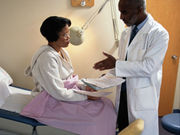Reduction in pain, and significant increase in patient satisfaction for active TENS group
THURSDAY, Jan. 12, 2017 (HealthDay News) — Transcutaneous electrical nerve stimulation (TENS) can reduce pain during office hysterectomy without sedation, according to a study published in the February issue of Obstetrics & Gynecology.
Juan F. Lisón, M.D., Ph.D., from Universidad CEU Cardenal Herrera in Valencia, Spain, and colleagues randomized 138 women to active TENS, placebo TENS, or control group (46 women per group) to assess the pain-relieving effect of TENS during office-based hysterectomy. Active TENS consisted of high-frequency, high-intensity TENS application with two electrodes placed parallel to the spinal cord at the T10 to L1 and S2 to S4 levels. Participants were connected to the TENS unit in the placebo group, but no electrical stimulation was delivered. Self-reported pain intensity measured on a visual analogue scale was the primary outcome.
The researchers found that the active TENS group had a decrease in visual analogue scale pain scores compared with the placebo group (entry, −11 mm; contact, −21.9 mm; and biopsy, −30.5 mm; P < 0.001). The pain reduction reached the minimum clinically relevant difference. There were significant differences between the active TENS and placebo groups regarding satisfaction (1.3; P = 0.001).
“Transcutaneous electrical nerve stimulation reduces pain and increases patient satisfaction during office hysteroscopy without sedation,” the authors write.
Full Text (subscription or payment may be required)
Copyright © 2017 HealthDay. All rights reserved.








